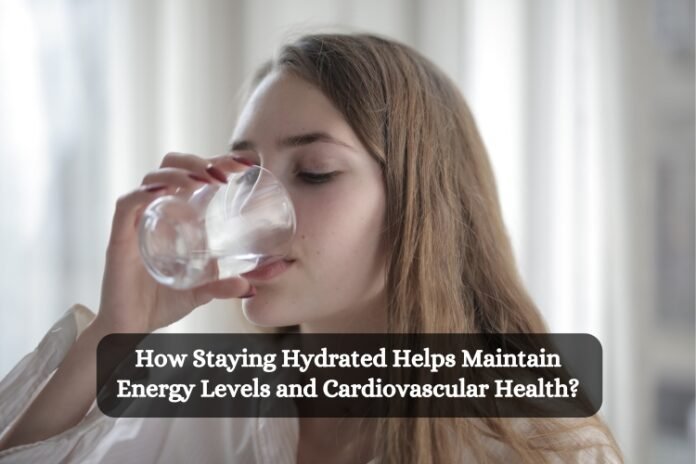Water is essential to maintaining good health and plays a crucial role in everything from boosting energy to promoting optimal heart function. While many people focus on hydration for physical performance or skin health, the connection between hydration and heart health is just as significant.
Your heart, a vital muscle, depends on proper hydration to function efficiently. In this article, we’ll explore the importance of staying hydrated for maintaining energy levels, supporting cardiovascular health, and enhancing overall vitality.
The Role of Hydration in Cardiovascular Wellness
The cardiovascular system circulates blood throughout the body, delivering oxygen and nutrients to cells while removing waste. Staying properly hydrated ensures that your heart and blood vessels function effectively, supporting overall cardiovascular wellness.
- Maintaining Healthy Blood Volume: Water is a major component of your blood. Hydration helps maintain blood volume, ensuring that the heart can pump blood efficiently without unnecessary strain.
- Enhancing Circulation: Dehydration can thicken the blood, making it more difficult for the heart to pump. This can lead to an increased risk of high blood pressure and other cardiovascular complications.
- Regulating Temperature: Water helps regulate body temperature through sweating, preventing overheating during physical activity. Proper hydration reduces the strain on the heart by maintaining a stable internal environment.
Impact of Dehydration on Energy Levels and Heart Health
- Fatigue and Reduced Physical Performance Dehydration is a common cause of fatigue. Without adequate water, your body struggles to transport oxygen and nutrients to muscles and organs, leading to tiredness and reduced physical performance. This also causes the heart to work harder to compensate for the lack of blood volume.
- Increased Heart Strain When dehydrated, your heart rate rises to compensate for the decrease in blood volume, placing additional strain on the heart. Over time, this added stress can lead to complications, particularly for those with pre-existing heart conditions.
- Blood Pressure Imbalance Dehydration can cause a drop in blood pressure (hypotension), resulting in dizziness or fainting. On the other hand, chronic dehydration can contribute to high blood pressure due to restricted blood flow and constricted blood vessels.
Hydration Tips for a Healthy Heart
- Stay Ahead of Thirst Thirst often appears as a late indicator of dehydration. To stay hydrated, drink water regularly throughout the day, especially during and after exercise or physical activity.
- Monitor Fluid Intake While the “8 glasses a day” guideline is useful, your hydration needs vary depending on factors like age, activity level, and the climate. Pay attention to your body’s signals and adjust your intake accordingly.
- Incorporate Hydrating Beverages Along with water, try consuming herbal teas, coconut water, and low-sugar electrolyte drinks to boost hydration and support heart health.
- Eat Hydrating Foods Many fruits and vegetables, such as cucumbers, watermelon, and oranges, contain high water content and offer essential nutrients that support cardiovascular health.
- Limit Dehydrating Substances Alcohol and caffeine can lead to dehydration, so be mindful of your intake. Balance these beverages by drinking plenty of water alongside them.
Hydration Strategies for Different Lifestyles
- Active Individuals If you exercise regularly, your body’s need for hydration increases because of water loss through sweat. Be sure to drink water before, during, and after physical activity to stay hydrated and sustain energy levels.
- People with Heart Conditions If you have cardiovascular issues, speak to your healthcare provider about your hydration needs. In certain cases, excessive fluid intake can strain the heart, especially in conditions like heart failure.
- Older Adults As we age, our sense of thirst may diminish, making older adults more vulnerable to dehydration. Maintaining a consistent hydration routine is crucial for preserving heart health and energy levels.
Signs of Dehydration that Impact the Heart
Being mindful of dehydration’s effects on the cardiovascular system can help prevent complications. Watch for these signs:
- Rapid heartbeat or palpitations
- Low blood pressure, causing dizziness or fainting
- Extreme fatigue or weakness
- Dark yellow urine or infrequent urination
If you notice these symptoms, hydrate immediately and seek medical advice if they persist.
Conclusion: The Importance of Hydration for Heart and Energy Health
Hydration is not just about quenching thirst it is fundamental to energy, vitality, and heart health. By consistently drinking water, listening to your body’s hydration cues, and maintaining a balanced diet, you can ensure both your cardiovascular system and energy levels remain at their best.
If you’re concerned about hydration or its effects on heart health, consulting a trusted healthcare provider or a leading best heart hospital in Pune can offer personalized guidance and support.
Remember, proper hydration is key to a healthy, energetic life. Make it a priority and take proactive steps toward improving your heart health and overall well-being.

